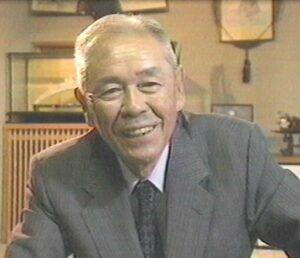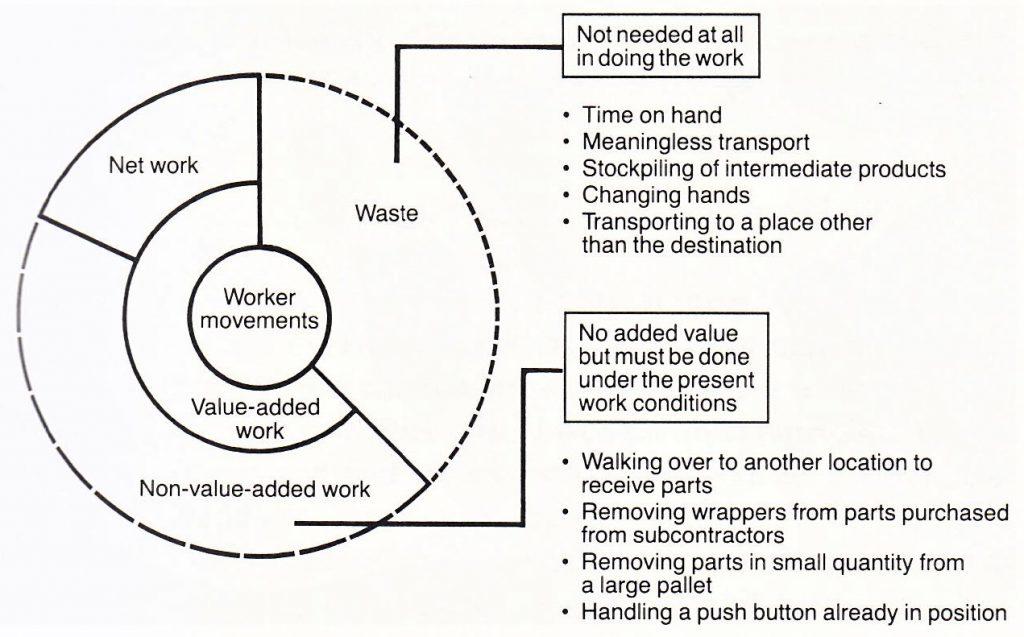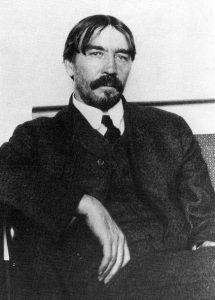
Mr. Taiichi Ohno had a theory of nonproductivity that people know but which they do not truly understand. In the image below, Ohno-san makes a clear differentiation between the types of work that workers do:
- Work that is waste
- Non-value added work that is necessary under present conditions
- Net work
By “net work,” Ohno-san meant the portion of work that is value-added, meaning, “some kind of processing” (Ohno, TPS, p. 57).
Ohno-san also said, “Moving is not necessarily working.” He said, “The ideal is to have 100 percent value-added work,” meaning, no waste (TPS, p. 58). This would lead to the “Full Work System” (TPS, p. 59). Importantly, the financial reward for the worker’s work, their remuneration, would reflect their actual contribution to making the product. In his view, workers should not be paid for waste, and it is management responsibility to assure that workers do value-added work and get paid for doing that (and non-value-added but necessary work), and thus not get paid for doing work that is waste. Ohno-san surely reasoned that paying workers for waste would be a poor use of company money (increase costs) and reduce profit.
Ohno-san’s specific theory of nonproductivity of work was preceded by a more general theory of nonproductivity advanced by sui generis economist and sociologist Thorstein Veblen in his 1899 book, The Theory of the Leisure Class: An Economic Study of Institutions. Veblen’s theory of nonproductivity, one of numerous novel and impactful ideas in the book, is an aspect of production that neoclassical economists ignore, then and now, because they do not think nonproductivity exists or refuse to acknowledge that it does. Dr. Veblen showed, in exacting theoretical and practical detail, that nonproductivity was real and must be accounted for in economic theory. The simple idea he put forward, radical in its time and still radical today, was:
Net Productivity = Productivity – Nonproductivity
Dr. Veblen demolished the accepted economic argument that individual persons are rewarded (monetarily compensated) based on what they produce in doing their work. Yet, some forms of work are clearly nonproductive in that they do not contribute to making a product. In Toyota’s management system, waste is nonproductive. In addition, management is considered nonproductive because they have no role in producing the product. Managers are a nonproductive cost that customers must pay for. So, for managers to be worth their pay, or a portion of it, they must do things that somehow connect to the productive work that workers do such as developing people’s problem-solving skills. Developing people, as well as engaging people on the shop and office floor to improve work, would be “net [management] work,” while manager’s other work is comprised of non-value-added work (necessary under present conditions) and waste.
In most companies — those ruled by classical management — manager’s “net work” is near zero. Their workday, busy as it is, is filled with non-value-added work (only some of which necessary under present conditions) and waste — with most of the time working (and movement — walking, talking, nodding, etc.) being waste. Needless to say, the reward for one’s work does not exactly coincide to one’s contribution to the product. The situation is worse for senior leaders. Take for example a worker who is paid $350 a day and spends the day successfully responding to a part shortage so that a one-million-dollar product that generates $200,000 dollars in operating profit can be delivered to a customer on-time. Compare that to the CEO of a big company who is paid $75,000 per day who works on budgets, or internal political problems, or rearranges the organization chart, or calculates how many people to lay off. Neoclassical economics says that the CEOs contribution that day is more productive because the CEO was paid more money than the worker, and that both the CEO and the worker got their rightful share of income. But, in fact, the CEO got paid a lot of company money for waste.
Dr. Veblen understood that work, long and hard as it may be for CEOs, is not necessarily productive, and that one’s reward for work does not accurately reflect one’s contribution to the work. Ohno-san, more than 50 years later, understood this as well. Every Toyota and Lean person understands this too because they have witnessed it firsthand. Yet, important people in high places obviously favor the neoclassical view of productive work and abhor Veblen’s and Ohno-san’s progressive view (meaning, favoring change, improvement, making progress) — the mere reality that not all work is actually work — because it defends and preserves the status quo (which nearly all economists are in league with).
So, when it comes to TPS and Lean management, they both demand things of top leaders that they are not willing to do. And they demand that economists also do what they are not willing to do — acknowledge the existence and significance of nonproductivity. The guiding economic principle of productivity (neoclassical) competes against the guiding principle of nonproductivity (waste), and the latter usually loses. It is a royal pathology that sustains classical management — a system of profound privilege — to be as productive as one desires, or not. And so, progress in the practice of both management and leadership, and the related advancement of humanity, are slowed down or halted.
Additionally, leaders frequently misdirect resources to nonproductive uses such as stock buybacks, budget cuts (to training, R&D, operations, IT, customer service, benefits, etc.), hiring more managers, and ever-higher executive pay and benefits. Nonproductivity, it turns out, has great social significance and is thus highly sought after. Employments that are disconnected from productive work are viewed as having far greater status and honor than productive work. It accounts for both leaders’ nonparticipation in kaizen and the explosion of employments related to moving money around from one place to another (so-called “money games”). The rapid growth in nonproductive employments in recent decades surely comes to the detriment of corporate and national productivity growth.
The acquisition and preservation of status to sustain nonproductive work, while at the same time accumulating financial rewards at a rate that enormously exceeds the actual value of the work (near-zero “net [management] work”), means leaders must, knowingly or not, retard progress in its various forms and thus lower the efficiency of productive work. While this inefficiency preserves status, rights, and privileges, it makes leaders maladaptive to learning and thus unable to break their preconceptions, traditions, and habits. Leaders’ methodological assumptions (preconceptions, traditions, and habits) used in the process (method) of reasoning to formulate understanding and business decision-making are at odds with achieving higher productivity because they increase nonproductivity. The things that leaders do, illuminated by the CEOs Wealth Creation Playbook, mostly relate to “getting” wealth rather than “producing” wealth. That is why despite decades of great prosperity and GDP growth, there are so many people still living in poverty and why so many middle-class families have slipped into lower middle or working poor classes.
In classical and neoclassical economics, the factors of production are land, labor, and capital. In progressive economics, the factors of nonproduction are preconceptions, traditions, and habits. Together these produce massive amounts of waste, unevenness, and unreasonableness despite the appearance of economic efficiency. By ignoring nonproductivity, classical management, rooted in classical and neoclassical economics, is a powerful and purposeful restraint of both productivity and progress. While this serves the interests of preserving the status quo to benefit leaders, it denies humanity the types and forms of progress that are needed to assure survival.
If you want to know more about this important subject, more about what is going on and why leaders resist and reject progressive change, please read the books below. It is only by knowing more about this problem that progress can be made. You can’t just keep doing what you are doing and expect a better result. These books will change your thinking and inspire new ideas and new actions to take in search of practical solutions.



